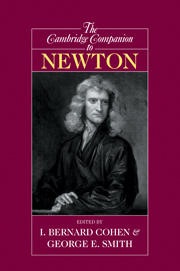Book contents
- Frontmatter
- Introduction
- 1 Newton's philosophical analysis of space and time
- 2 Newton's concepts of force and mass, with notes on the Laws of Motion
- 3 Curvature in Newton's dynamics
- 4 The methodology of the Principia
- 5 Newton's argument for universal gravitation
- 6 Newton and celestial mechanics
- 7 Newton's optics and atomism
- 8 Newton's metaphysics
- 9 Analysis and synthesis in Newton's mathematical work
- 10 Newton, active powers, and the mechanical philosophy
- 11 The background to Newton's chymistry
- 12 Newton's alchemy
- 13 Newton on prophecy and the Apocalypse
- 14 Newton and eighteenth-century Christianity
- 15 Newton versus Leibniz: from geometry to metaphysics
- 16 Newton and the Leibniz-Clarke correspondence
- Bibliography
- Index
11 - The background to Newton's chymistry
Published online by Cambridge University Press: 28 May 2006
- Frontmatter
- Introduction
- 1 Newton's philosophical analysis of space and time
- 2 Newton's concepts of force and mass, with notes on the Laws of Motion
- 3 Curvature in Newton's dynamics
- 4 The methodology of the Principia
- 5 Newton's argument for universal gravitation
- 6 Newton and celestial mechanics
- 7 Newton's optics and atomism
- 8 Newton's metaphysics
- 9 Analysis and synthesis in Newton's mathematical work
- 10 Newton, active powers, and the mechanical philosophy
- 11 The background to Newton's chymistry
- 12 Newton's alchemy
- 13 Newton on prophecy and the Apocalypse
- 14 Newton and eighteenth-century Christianity
- 15 Newton versus Leibniz: from geometry to metaphysics
- 16 Newton and the Leibniz-Clarke correspondence
- Bibliography
- Index
Summary
To those who are unfamiliar with the history of alchemy, the image of Isaac Newton poring over manuscripts illuminated strangely with dragons, sceptered gods, and couples copulating within flasks cannot fail to educe a strikingly discordant tone. How could such a great mathematical mind, the father of modern physics, concern himself with such seemingly unintelligible gibberish? Must we simply throw up our hands at the “superstitious” Zeitgeist of the age, as Newton's nineteenth-century biographers did, and conclude that he was deluded by the work of “a fool and a knave”? Should we conclude, with more recent scholars of Newton's alchemy, that he was engaged in a fundamentally religious quest in which alchemy would provide the key by which God's immaterial activity could be linked to the phenomenal world of matter? Or is there yet another answer - that Newton's alchemical research was primarily an investigation of the microstructure of matter, the forces of chemical affinity, and the ability of material substances to undergo radical transformation in the laboratory? Needless to say, the matter is not easy to decide, given that Newton copied, abstracted, commented upon, and composed about a million words of manuscript material on the subject of alchemy, over a period spanning more than thirty years. One thing, however, is sure: in order to understand Newton's fascination with alchemy, we must not consider the enterprise from an anachronistic viewpoint that equates alchemy with the irrational, the mystical, or the anti-mechanical. If we wish to comprehend Newton's deep involvement in this subject, we must have a firm grounding in the subject of alchemy as it existed in the seventeenth century.
- Type
- Chapter
- Information
- The Cambridge Companion to Newton , pp. 358 - 369Publisher: Cambridge University PressPrint publication year: 2002
- 4
- Cited by



